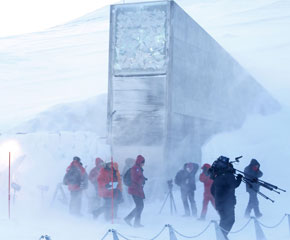“This is a frozen garden of Eden,” said European Commission President Jose Manuel Barroso at the opening ceremony.
Aimed at safeguarding biodiversity in the face of climate change, wars and other natural and man-made disasters, the new seed bank has the capacity to hold up to 4.5 million batches, or twice the number of crop varieties believed to exist in the world today.
In sub-freezing temperatures, Kenyan environmentalist and Nobel Peace Prize winner Wangari Maathai and Norwegian Prime Minister Jens Stoltenberg inaugurated the vault by symbolically depositing a box containing grains of rice in one of its three spacious cold chambers.
“The world is a bit safer today,” Cary Fowler, executive director of the Global Crop Diversity Trust and project.
Norway has assumed the entire six-million-euro charge for building the so-called “doomsday vault” in its Arctic archipelago of Svalbard, just some 1 000 kilometres from the North Pole.
Noah’s Ark
Overlooking a fjord and adorned for the occasion with a life-size ice sculpture of a polar bear, the vault forms a long trident-shaped tunnel bored deep into the sandstone and limestone.
Only the entrance juts out of the snow-covered mountainside, emerging as a narrow, rectangular portal made of cement and steel, illuminated with artwork made up of mirrors and bits of metal that create a colourful prism visible for miles around.
Even if the freezer system fails, the permafrost will ensure that temperatures never rise above minus 3.5 degrees Celsius.
Contributions from the more than 1 300 other seed banks worldwide are expected at a later date. Protected by high walls of fortified concrete, an armoured door, a sensor alarm and the native polar bears that roam the region, the “doomsday vault” has been built 130 metres above current sea level.
Biodiversity is essential because it enables crops to adapt to new conditions, resist diseases, increase their nutritional value and become less dependant on water.
This is especially crucial as the global population is expected to rise to nine billion by 2050. Twice the size of Belgium and counting just 2 300 inhabitants, the Svalbard archipelago, where ironically no crops grow, is considered the ideal location for the new vault due to its remote location far from civil strife.

